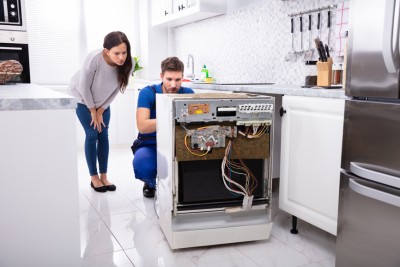My Dishwasher Isn’t Cleaning Well Enough?
If the dishes in your dishwasher aren’t coming out clean, there are many possible causes. Sometimes the problem with a dishwasher not washing dishes is not related to the type or temperature of the water, but to how much water gets into the dishwasher. If the problem with the dishwasher not washing dishes is that the water is not hot enough, this is an easy fix to clean the dishwasher properly again.
The temperature of the water in the dishwasher must reach at least 120 degrees Fahrenheit in order to wash the dishes properly. If the water in the water heater does not heat up enough, it may affect the performance of your dishwasher. Dishwashers have heaters to increase the temperature of the water for sterilization and better cleaning; even cold water won’t activate the detergent, so if the water isn’t hot enough, the dishwasher won’t do it either.
Your dishwasher will have limited functionality without the right amount of water. A dishwasher requires the right amount of water at the right temperature and pressure for optimal cleaning. Removing the hardness or filtering your home water will make your dishwasher cleaner than ever before. If you live in an area with hard water, you may need dishwasher detergent to clean your dishes properly.
Water and detergent cannot clean surfaces they cannot reach, so be careful when loading dishes. If you have hard water and use a detergent that doesn’t react well, you’ll probably notice that your glasses and cups don’t look clean when they come out of the dishwasher. You may notice that some food remains on the plates or that your pots are not dishwasher safe. The default setting means that the dishwasher may not wash with water or with enough water pressure to wash the dishes.
If you don’t clean the dishwasher tub when this happens, some of the debris will flake off and mix with the fresh water you use to wash dishes, rendering the dishwasher useless. Even though your dishwasher’s main job is to wash dishes (and it cleans itself to some extent every time you run a wash cycle), your dishwasher can still accumulate debris over time.
Your dishwasher will use one portion of water for washing dishes and another for rinsing. This will help your dishwashers drain water better, which means cleaner water for rinsing dishes. In the same way that a new dishwasher can benefit from cleaner dishwashing water, your old dishwasher can benefit too.
The first and best tip for improving the quality of your dishwasher is to preheat the water. Filling the kitchen sink with hot water before the wash cycle begins can make it easier for the dishwasher to reach it. You can also turn on the kitchen sink for a minute before starting the dishwasher so that hot water enters the machine from the very beginning of the wash cycle. Run ensures that only very hot water goes into the dishwasher, which helps your soap work better and removes debris from dishes more easily.
Fill the sink with hot soapy water to wet the dishes before putting them in the dishwasher. Rinse dishes quickly before loading them into the dishwasher so that only small food residues enter the machine.
Filling the dishwasher incorrectly can cause the spray to not reach all of the dishes, causing food residue to get stuck. If the spray arms become clogged with limescale and food residue, water cannot be properly sprayed through the nozzles, preventing dishwashing.
If the dishes are blocking other dishes from splashing water, the clogged dishes will not be cleaned. If dirt and grime clog the small holes in the wash arm, the water won’t be able to get out, which means your dishes won’t be clean. Make sure dishes or pots in the lower basket are not blocking the rotation of the spray arm, and load bowls and other deep containers with the open side down to prevent dirty laundry water from collecting in them.
Dishwashers use tap water to wash dishes, so if tap water isn’t clean, minerals will build up in it and your dishes will look dirty and unwashed. Dishwashers need adequate hot water to wash dishes properly, usually around 140 degrees Fahrenheit.
If you notice that the dishwasher is leaving marks on your dishes, it may be due to a lack of hot water. You should also check if your dishwasher should be connected to a hot or cold water outlet. You may need to increase the temperature of your domestic water heater to improve the performance of your dishwasher.
If you tried the previous tips and the dishwasher still doesn’t clean well, there may be a problem with the water inlet valve. The water inlet valve is one of the most common dishwasher failures, and if it doesn’t provide the correct water level in the tub, it can be the reason why the dishwasher isn’t doing the dishes properly. When the water inlet valve is clogged or damaged, it cannot provide enough water to wash dishes in the dishwasher.
If the water inlet valve is faulty, water from the household water pipe will not be able to enter the dishwasher. When the manual filter gets clogged, the dishwasher continues to circulate dirty water, leaving behind tiny sticky foods and potentially smelly dishes. Small pieces of food, grease, and soap scum can build up inside the dishwasher, preventing it from working properly. Despite the regular use of water and detergent, dirt and debris can build up in the dishwasher, causing blockages and dirty dishes.
If you can’t find the cause of the dishwasher problems then call for dishwasher repair in Oklahoma City and be sure and contact Appliance Repair OKC Services by calling 405-378-4566 or visit our local website at https://www.okcappliance.com or also our Google business website at https://cli.re/Dyq1ME. Call now!

